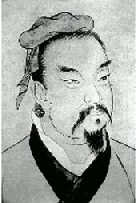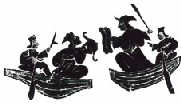 Sun Wu was a native of the State of Qi during theSpring and Autumn Period(770-476 BC). The family name of his ancestors, who were Qi nobles, was Tian. Sun Wu's grandfather, Tian Shu, was a high-ranking official who excelled in military affairs. He was awarded land and given the family name Sun by the King of Qi for his meritorious service during an expedition to the State of Ju (present-day Juxian County of East China'sShandong Province). Sun Ping, Sun Wu's father, was one of the king's top officials.
Sun Wu was a native of the State of Qi during theSpring and Autumn Period(770-476 BC). The family name of his ancestors, who were Qi nobles, was Tian. Sun Wu's grandfather, Tian Shu, was a high-ranking official who excelled in military affairs. He was awarded land and given the family name Sun by the King of Qi for his meritorious service during an expedition to the State of Ju (present-day Juxian County of East China'sShandong Province). Sun Ping, Sun Wu's father, was one of the king's top officials.
Sun Wu's privileged family background provided good conditions for his studies. He began reading the classics in his childhood and achieved a high standard of scholarship. Being a descendant of generations of generals, Sun Wu had unique and ideal conditions under which to study the art of war. He read all the established martial classics, and also experienced war firsthand.
When Sun Wu was in his teens, the State of Qi began to decline, and internal struggles for power within the court became increasingly fierce. Disgusted with these internal struggles, Sun Wu decided to go to a place far from home in order to realize his ambitions. In 517 BC when he was 18, Sun Wu went to the State of Wu and became acquainted with Wu Zixu, a famous general.
In the State of Wu, Sun Wu lived a hermit's life deep in the mountains and summarized the results of his research in his 13-chapter bookThe Art of War.
 |
|
A battle on water, a Han Dynasty brick relief.
|
Later, on the recommendation of Wu Zixu, Sun Wu was appointed general by the State of Wu. He was strict with his troops and exercised able leadership in war maneuvers. In 512 BC, he won victory after victory in battles against the two small states of Zhongwu and Shu.
In 506 BC the State of Chu attacked the State of Cai -- a vassal state of Wu. The king of Wu, together with Wu Zixu and Sun Wu, led 30,000 troops against the Chu. At the command of Sun Wu, the Wu troops changed their route, abandoned their warships, and went deep into the Chu hinterland where they took the Chu troops by surprise, forcing them to retreat in defeat. Upon the Chu capital being captured, the king fled in confusion.
